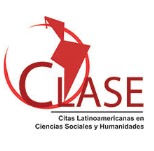Ohana – Terapia de Grupo Colaborativa e o Construcionismo Social
Palabras clave:
terapia em grupo, construcionismo social, saúde mentalResumen
Esse artigo se baseia em um projeto de trabalho de terapia em grupo chamado Ohana1 que aconteceu em um ambiente ambulatorial em um hospital psiquiátrico local. A participação dos membros do grupo na co-criatuação de novo conhecimento para uma melhor compreensão das relações humanas e a busca do bem estar comum foram examinadas através de uma investigação qualitativa, usando a metodologia de pesquisa de ação participativa. Este artigo busca gerar novas reflexões e, portanto, impactar o campo das práticas na saúde mental, em particular da terapia de família. Pode oferecer novos caminhos e compreensão dos trabalhos de terapia em grupo com indivíduos considerados doentes mentais crônicos . Além disso, ilustra como é a prática das ideias construcionistas sociais em um ambiente de trabalho em grupo, expandindo nossa consciência e aproximando nossa humanidade no tratamento de pessoas que foram diagnosticadas com doença mental.
Descargas
Citas
Andersen, T. (1992). Reflections on reflecting with families. In S. McNamee & K. Gergen (Eds.), Therapy as social construction (pp. 54-68). London, England: Sage Publications.
Anderson, H. (1997). Conversation, language and possibilities: A postmodern approach to therapy. New York, NY: BasicBooks.
Becvar, R. J., Canfield, B. S., & Becvar, D. S. (1997). Group work: Cybernetic, constructivist and social constructionist perspectives. Denver, CO: Love Publishing Company.
Cecchin, G. (1992). Constructing therapeutic possibilities. In S. McNamee & K. Gergen (Eds.), Therapy as social construction (pp. 86-95). London, England: Sage Publications.
Chenail, R., St. George, S., & Wulff, D. (2007). Action research: The methodologies. In P. L. Munhall (Ed.), Nursing research: A qualitative perspective (pp. 447-461). Sudbury, MA: Jones and Bartlett Publishers.
Dalton, J. H., Elias, M. J., & Wandersman, A. (2001). Community psychology: Linking individuals and communities. Belmont, CA: Wadsworth/Thomson Learning.
Elden, M., & Levin, M. (1991). Cogenerative learning: Bringing participation into action research. In W. F. Whyte (Ed.), Participatory action research (pp. 127-142). Newbury Park, CA: Sage.
Gergen, K. J. (2001). Social construction in context. Thousand Oaks, CA: Sage Publications.
Gergen, K. J. (2006). Therapeutic realities: Collaboration, oppression and relational flow. Chagrin Falls, OH: Taos Institute Publications.
Gergen, K. J. (2009). Relational being: Beyond self and community. New York, NY: Oxford University Press.
Gergen, K. J. (2010, August 1). The self: Colonization in psychology and society. Retrieved fromhttp://www.swarthmore.edu/Documents/faculty/gergen/The_Self_Colonization_in Psychology_and_SocietyThe_Self_Colonization_in_Psychology_and_Society1.pdf
Gergen, K. J., Hoffman, L. & Anderson, H. (1996). Is diagnosis a disaster? A constructionist trialogue. In F. W. Kaslow (Ed.), Relational Diagnosis (pp.102-118). New York, NY: John Wiley & Sons..
Gergen, M. & Gergen, K. J. (2008). Social construction: Entering the dialogue (2nd ed.). Chagrin Falls, OH: Taos Institute Publications.
Giddens, A. (1979). Central problems in social theory. Action, structure and contradiction in social analysis. Berkeley, CA: University of California Press.
Kemmis, S., & McTaggart, R. (2003). Participatory action research. In N. Denzin & Y.S. Lincoln (Eds.), Strategies of qualitative inquiry (pp 336-396). Thousand Oaks, CA: Sage Publications.
Lax, W. D. (1992). Postmodern thinking in a clinical practice. In S. McNamee & K. Gergen (Eds.), Therapy as social construction (pp. 69- 85). London, England: Sage Publications.
Levine, M., Perkins, D., & Perkins, D. (2005). Principles of community psychology. New York, NY: Oxford University Press.
McNamee, S. (1992). Reconstructing identity: the communal construction of crisis. In S. McNamee & K. Gergen (Eds.), Therapy as social construction (pp. 186-199). Thousand Oaks, CA: Sage Publications.
McNamee, S., & Gergen, K. (1999). Relational Responsibility: Resources for sustainable dialogue. Thousand Oaks, CA: Sage Publications.
Melucci, A. (1994). A strange kind of newness: What’s “new” in new social movements? In E. Larana, H. Joohnston, & J. R. Gusfield (Eds.), New social movements: From ideology to identity (pp. 101-130). Philadelphia, PA: Temple University Press.
Orford, J. (2008). Community psychology: Challenges, controversies and emerging consensus. West Sussex, England: John Wiley & Sons.
Reason, P., & Bradbury, H. (Eds.). (2001). Handbook of action research: Participative
inquiry and practice. London, England: Sage.
Revenson, T. A & Seidman, E. (2004). Looking back and moving forward. In Revenson et al. (Eds.), A quarter century of community psychology: Readings from the American Journal of Community Psychology (pp. 3-31). New York, NY: Kluwer Academic/Plenum Publishers.
Revenson, T. A., & Schiaffino, K. M. (2000). Community-based health interventions. In J. Rappaport & E. Seidman (Eds.), Handbook of community psychology (pp. 471-493). New York, NY: Kluwer Academic/Plenum.
Scheff, T. (1966). Being mentally ill. Chicago, IL: Aldine Publishing Company.
Shotter, J. (1993). Cultural politics of everyday life. Toronto, Canada: University of Toronto Press.
Smith, D. B. (2007). Muses, madmen and prophets: Rethinking the history, science and meaning of auditory hallucinations. New York, NY: The Penguin Press.
Szasz, T. S. (1960). The myth of mental illness. American Psychologist, 15, 113-118.
Szasz, T. S. (1974). The myth of mental illness: Foundations of a theory of personal conduct (Rev. ed.). New York, NY: Harper & Row.
Descargas
Cómo citar
Número
Sección
Licencia
Autores que publicam nesta revista concordam com os seguintes termos:- Autores mantém os direitos autorais e concedem à revista o direito de primeira publicação, com o trabalho licenciado simultaneamente sob uma Licença Creative Commons Attribution após a publicação, permitindo o compartilhamento do trabalho com reconhecimento da autoria do trabalho e publicação inicial nesta revista.
- Autores têm autorização para assumir contratos adicionais separadamente, para distribuição não-exclusiva da versão do trabalho publicada nesta revista (ex.: publicar em repositório institucional ou como capítulo de livro), com reconhecimento de autoria e publicação inicial nesta revista.
- Autores têm permissão e são estimulados a publicar e distribuir seu trabalho online (ex.: em repositórios institucionais ou na sua página pessoal) a qualquer ponto antes ou durante o processo editorial, já que isso pode gerar alterações produtivas, bem como aumentar o impacto e a citação do trabalho publicado (Veja O Efeito do Acesso Livre).

















